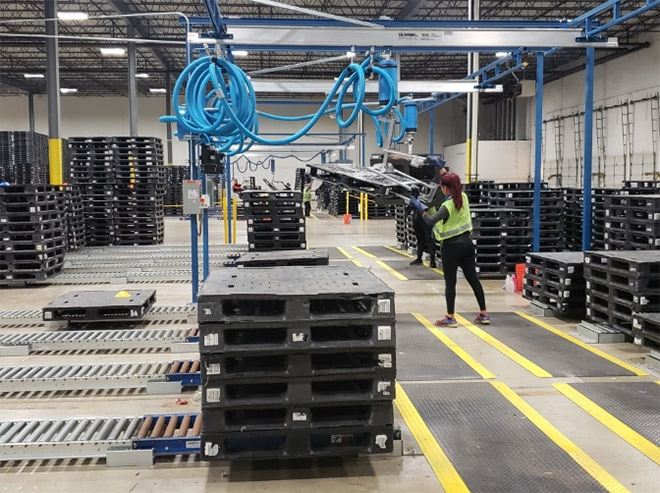Plastic’s versatility is undeniable. From lightweight water bottles to sturdy car bumpers, its strength, waterproof nature, and resistance to decay, plastic is versatile and durable. However, this very durability presents a major environmental challenge.
While recycling is a key player in tackling plastic waste, it can face logistical and cost hurdles. However, a promising solution offers a double win: reusable, pooled shipping pallets made from recycled plastic.
How Plastic Pallets Extend the Useful Life of Plastic
Globally, over 300 million tons of plastic are produced annually, with a staggering half of this destined for single-use purposes. This high volume of plastic production, particularly for single-use items, creates significant challenges when it comes to recycling. For instance, plastic bottles (PET #1) often have lids made from a different plastic (HDPE #2), confusing consumers about sorting. Luckily, innovations like dyeing recycled plastic black for consistent aesthetics and chemical recycling that breaks down plastic into its basic building blocks for high-quality reuse, even for food packaging, are on the rise.
According to the management consultant firm MarketsandMarkets, the booming recycled plastics market is projected to reach $43.5 billion by 2026, underlining the demand for sustainable alternatives. Embracing color-consistent recycled plastics extends plastic lifespans and diverts them from landfills. These advancements and better education and infrastructure pave the way for a more sustainable plastic future.
Pallets Made from Recycled Plastic Are Durable and Sustainable
Pallet plastic choice is critical — mixing types create unpredictable, unrecyclable results. Only a few plastics offer the ideal blend of strength and recyclability needed for repeated use. High-density polyethylene (HDPE) reigns supreme with its high impact resistance, perfect for withstanding warehouse and shipping rigors.
High-Density Polyethylene (HDPE) is projected to dominate the market for pallets, with its strength, temperature stability, and exceptional recyclability as key advantages. Beyond its core strengths, HDPE offers several additional benefits:
- Impact Resistance: HDPE boasts high impact resistance, which is crucial for withstanding the rigors of logistics (e.g., forklift bumps) and minimizing damage.
- Chemical Resistance: HDPE pallets excel in resisting a wide range of chemicals, including solvents, acids, and bases. This makes them ideal for various applications with minimal risk of damage from spills or cleaning agents.
- Food Safety: Unlike some plastics, HDPE doesn’t leach out chemicals, making it safe for the food supply chain. This is crucial to preventing food contamination.
- Hygiene: Unlike wood pallets, HDPE doesn’t absorb liquids, maintains consistent weight, and prevents odor retention. This allows for easy cleaning with soap and water or even sanitization with specialized methods, promoting better hygiene in storage and transportation environments.
Recycled plastic pallets offer a sustainability trifecta:
- Diverting plastic waste.
- Reducing supply chain inefficiencies by minimizing product damage and rejections from contaminated wooden pallets.
- Promoting circularity by being remolded into new pallets at the end of their lifespan.
Pooling systems further enhance efficiency by maximizing pallet use and optimizing transportation logistics.
Renting recycled plastic pallets from a pooling service creates a closed-loop system that benefits the environment in multiple ways. The provider collects used pallets, ensures cleanliness and functionality, transports them to new users, and recycles them at the end of their lifespan. In many cases, pallets can even be inspected by retailers and returned directly to the pallet pool to be used by other manufacturers, eliminating wasteful transportation legs from the supply chain. This maximizes pallet use, optimizes transportation, and exemplifies circular supply chain management for sustainable packaging and logistics. As of the end of 2023, iGPS purchased and/or recycled over 278 million pounds of post-consumer plastic to produce their pallets — plastic that might have otherwise ended up in a landfill or ocean. This highlights the significant environmental impact this closed-loop system can have.
Manufacturers concerned about sustainability and recycled plastics can opt for iGPS plastic pallets, which recycled over 278 million pounds of post-consumer plastic to produce their pallets in 2023. These pallets are bug-resistant, easy to clean, and contribute to a sustainable and climate-resilient supply chain. For more information, contact us at 800-884-0225, email a specialist at switch@igps.net, or visit our contact page.



